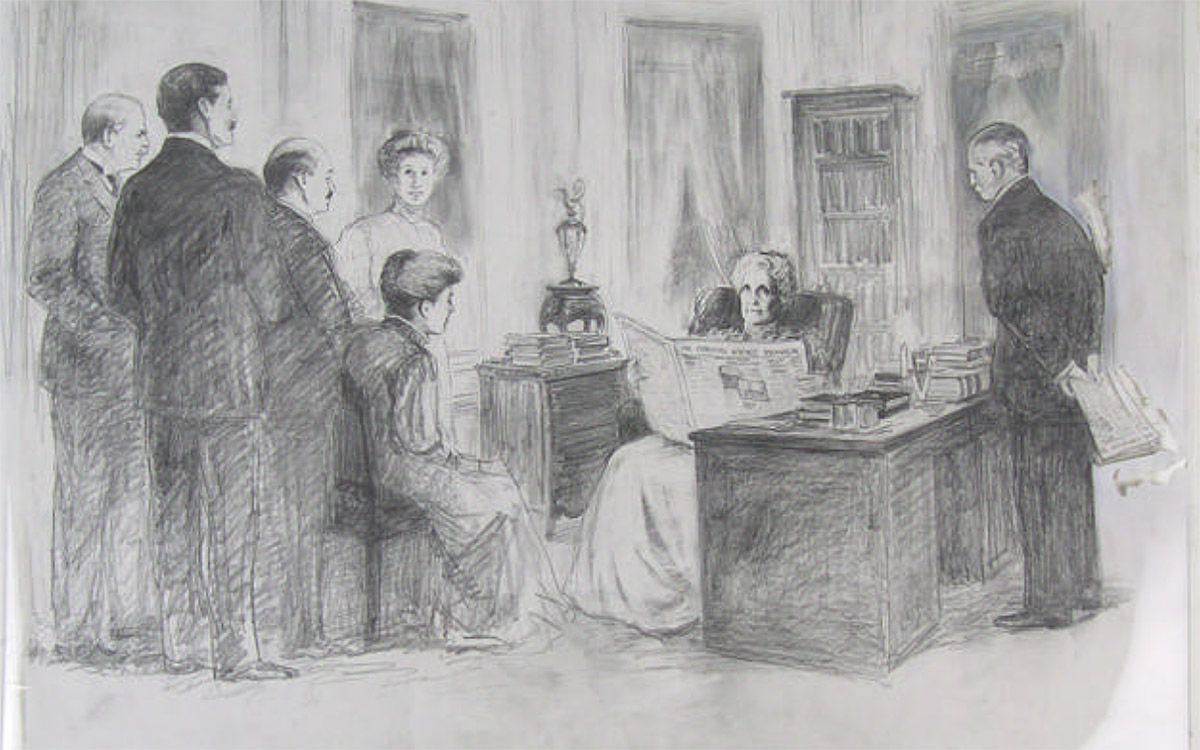Has the Monitor ever endorsed a presidential candidate?

“The Lightest of All Days” by Albert Forbes, depicting the first publication of The Christian Science Monitor on November 25, 1908. 1990.03.08. Art and Artifact Collection. © CSBD
Mary Baker Eddy founded The Christian Science Monitor in 1908, giving it the objective “to injure no man, but to bless all mankind.”1 She was deeply interested in local, national, and international affairs.
On November 3, 1908, the Boston Post ran this brief article, titled “Mrs. Eddy’s Politics” (later titled “Politics” in her Prose Works):
Mrs. Mary Baker Eddy has always believed that those who are entitled to vote should do so, and she has also believed that in such matters no one should seek to dictate the actions of others.
In reply to a number of requests for an expression of her political views, she has given out this statement: —
I am asked, “What are your politics?” I have none, in reality, other than to help support a righteous government; to love God supremely, and my neighbor as myself.2
Eddy’s statement was published the day of the 1908 US presidential election, in which Republican William Howard Taft bested Democrat William Jennings Bryan. That was about three weeks before the first issue of the Monitor was published (she had just commissioned the newspaper that July).
The American press has long endorsed candidates for elective office, based on factors such as their editorial stance and particular positions on key issues, as well as a candidate’s qualifications, perceived character traits, and electability. For example, the Los Angeles Times endorsed Taft in 1908 and endorsed presidential candidates in each subsequent election cycle, although it declined to endorse a candidate in 2024. The New York Times also backed Taft, and has endorsed a candidate in every election in its publishing history except 1852 and 1856.3
In contrast, the Monitor has endorsed presidential candidates just five times in the 28 elections held since its founding. It endorsed Herbert Hoover in 1928 and 1932; Thomas Dewey in 1944; Dwight Eisenhower in 1952; and Richard Nixon in 1960. Hoover won in 1928 and lost in 1932. Eisenhower won, while the other candidates lost.
The majority of these scanty endorsements were made during the 1941–1964 editorship of Erwin D. Canham (1904–1982), who joined the paper in 1925. He explained the Monitor’s support of Herbert Hoover in his book Commitment to Freedom.4
The Monitor’s 1952 editorial endorsing Eisenhower included this:
This newspaper is committed to no party or person. It is committed to the independent support of righteous government. It strives to be objective and just, but it has never believed that independence, objectivity and justice forbid it to reach conclusions on specific issues or situations in the light of its information.
However, The Christian Science Monitor does not presume to do its readers’ thinking. It offers its own views only as a contribution to the democratic process of testing opinions and shaping action by free discussion….5
Just as notable as those endorsements made over more than three decades, perhaps, is the fact that the Monitor has not endorsed a presidential candidate in 60 years. While this may have been disappointing or frustrating to some readers, reporting and editorializing on US politics has remained central to its coverage, along with its well-known international reporting. A recent story by staff writer Linda Feldmann, Will Florida’s Latino Voters Pick the Next President?, is an example of that approach.
We’ve gathered the five Monitor endorsements for you to read here (downloadable PDFs):
- 1928: A Plea for the Status Quo
- 1932: Generalities or Generalship
- 1944: Our Conclusion
- 1952: Reasons for our Confidence
- 1960: Presidential Choice
- Mary Baker Eddy, The First Church of Christ, Scientist, and Miscellany (Boston: The Christian Science Board of Directors), 353.
- Eddy, Miscellany, 276.
- https://www.latimes.com/opinion/story/2020-09-10/history-of-presidential-endorsements-la-times; https://www.nytimes.com/interactive/2016/09/23/opinion/presidential-endorsement-timeline.html?mtrref=www.google.com&gwh=B2A80C85ED03733A571AB4B2F28CA906&gwt=pay&assetType=PAYWALL
- Erwin D. Canham, Commitment to Freedom (Boston: Houghton Mifflin, 1958), 259–262.
- “The Monitor and the Campaign,” The Christian Science Monitor, 9 October 1952, 22.

